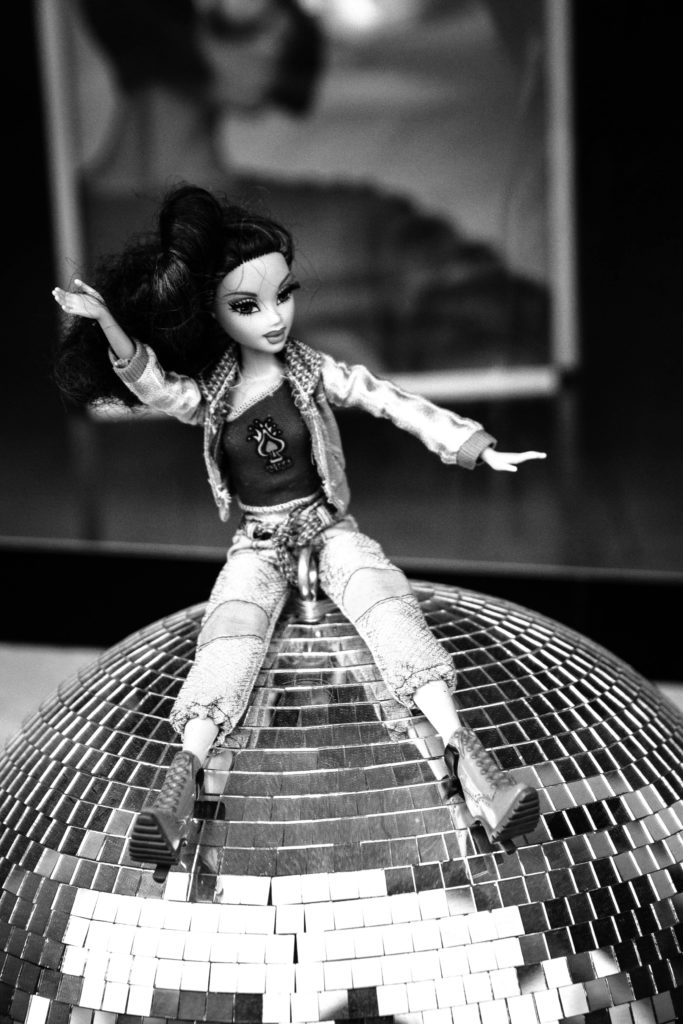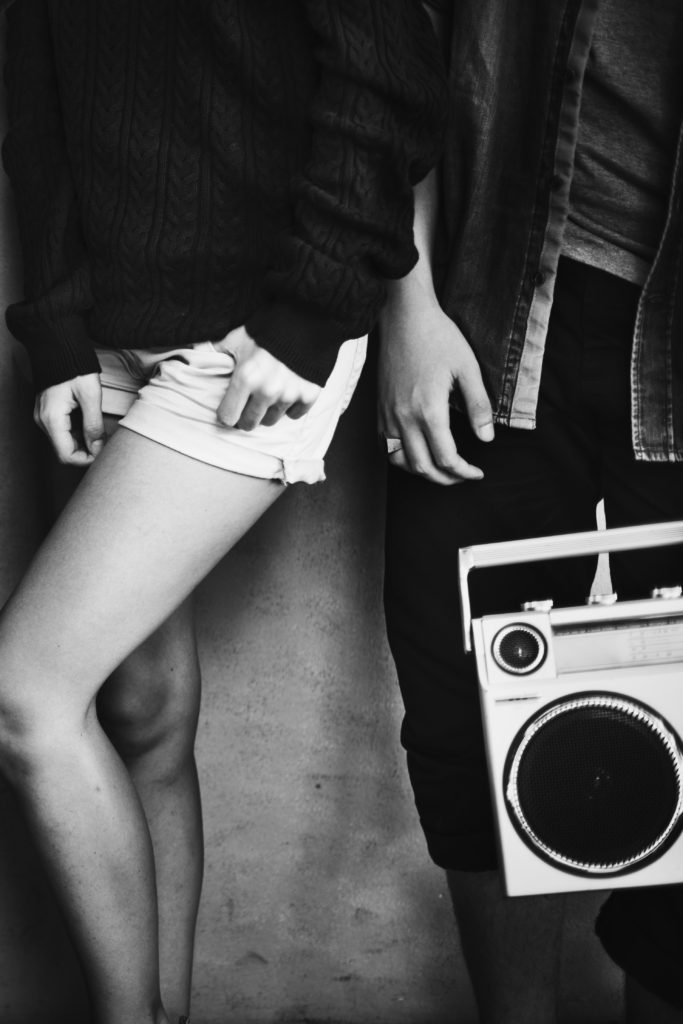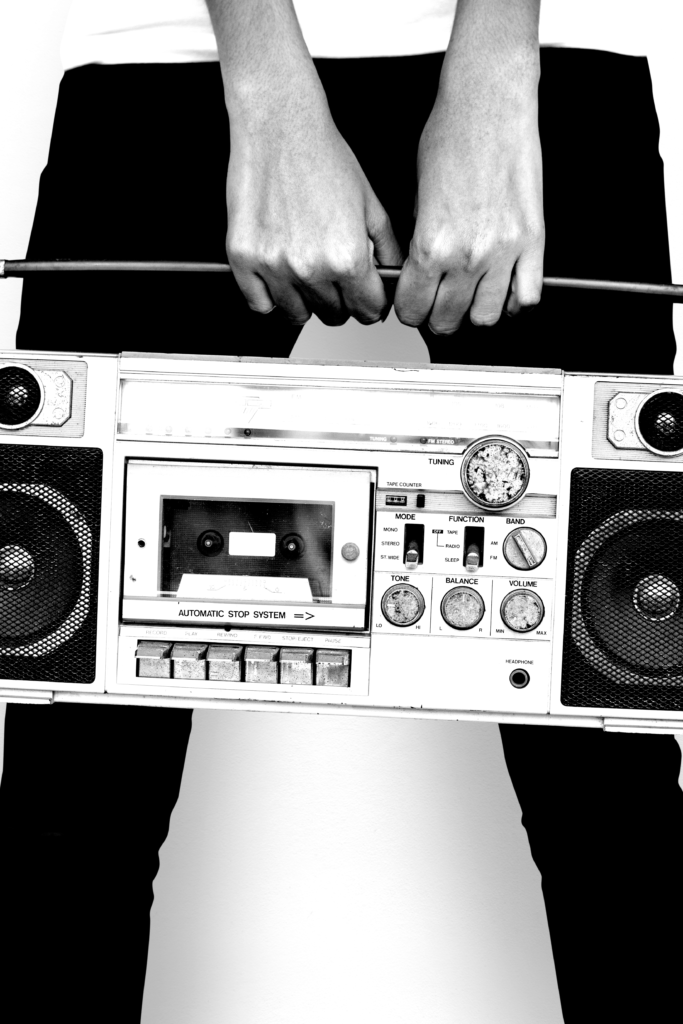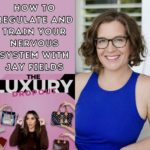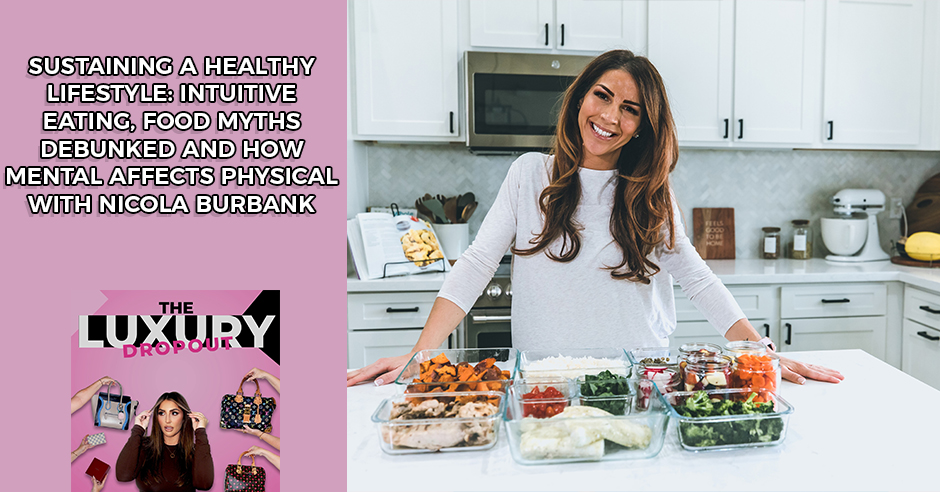
Have you been struggling with what’s what in this world of food allergies, veganism, keto, paleo, “doy” and gluten-free? Nutritional therapy practitioner, Nicola Burbank is a longtime friend from my sorority days at UNLV. She specializes in intuitive eating, which totally changed my life! “If it makes you feel like crap, don’t eat it.” Simple enough, right? Nicola sets the record straight. We get really personal about how mental health affects physical, and how she is teaching her daughter positive body image by educating and carefully choosing her words when it comes to food. This episode pertains to every single one of us so you’ll definitely want to listen!
—
Listen to the podcast here:
Sustaining A Healthy Lifestyle: Intuitive Eating, Food Myths Debunked and How Mental Affects Physical With Nicola Burbank
I’ve got a special guest and longtime friend, Nicola Burbank. Welcome to the show.
Thank you for having me. I’m excited.
I am excited to have you. To tell a little bit of background to the readers, Nicola and I met at UNLV in college. We were in the Greek system together, which seems like a freaking lifetime ago. What were we even doing? How are we alive? I honestly don’t know. I want to ask you, being in nutrition, at that time when we were in college and eating Del Taco and now at all times, did it start rising up in you then or was it way later that you made the discovery that you shouldn’t be eating that stuff on an everyday basis?
I was such a mess that I thought feeling like crap was normal. I don’t think I put two and two together until later on in life. It was forced upon me when I had Willow. In college, it was fun but I was not in the right mindset to think that way yet.
You know logically that you shouldn’t eat fast food. I remember going to class. I had a 7:30 lab and I remember doing the walk of shame down Maryland Parkway in a titty top.
I’ve done that one too many times leaving the Sigma Chi house.
I’m walking into class with my sunglasses on and everyone’s like, “Are you alive?”
There’s this true story about me. It was blackout the night before at the Sigma Chi house. It was right when they were doing midterms or something. I went to the wrong class. I took the wrong test. It was an instructor I had. That’s why I didn’t pick up on it. I was like, “There’s my instructor.” I was like, “How do I not know a thing on this test?” The next day, he pulls me into his office and he’s like, “Why did you take this test?” I was confused. I was embarrassed. I had to beg my other professor to let me take the test.
Did you tell your other professor that you had taken a different test?
That’s dang good that I got to C on a test. I had no idea what I was doing. It was a C- probably but I passed. That was probably my lowest.
After college, you and I lost touch for a little bit. Tell me what went on in between there. I know you had Willow and you got married and all those wonderful life things that happened. Tell me a little bit about how your life changed when you had Willow.
After college, I moved to Arizona. I was working in Arizona. I met my husband. We got married and got pregnant and had Willow. At 25, it hit me that I had digestive issues. At 25 to 30, between that time, I was going through a relationship and getting married and then we had Willow at 30. When I had her, I didn’t bounce back. I had a great pregnancy most of the time but then, in the end, it was rough. We had induced labor that turned into an emergency C-section.
I did not bounce back. I felt worse than I was already feeling. The symptoms were noticeable. Digestively, embarrassing noticeable. I knew something was not right. I started going to doctors to try to figure out what was going on. Everyone kept saying, “Your labs are coming back normal. You’re fine. All is well.” I couldn’t agree with them. I was like, “Something is wrong.” I’m scared. It’s not healthy. I couldn’t get out of bed. I was almost depressed. I was not feeling good.
I jumped around jobs. I was in student services for colleges. I did mainly their educational teaching and counseling for the kids. I ended up at ASU. I was miserable. I hated it. I felt sick all the time. I decided to spend the time with Willow and work part-time. We both believe in spirituality and that the universe sends us things when we’re meant to be sent them. By the grace of God, I met Dr. Khavari. He owns TriMotus.
The idea behind intuitive eating is nothing is off the table. Do what makes you feel good. Click To TweetI started working for him. Right away, he’s like, “You have food allergies.” I’m like, “No.” He was like, “You always have a stuffy nose. You always complain about a sore throat. You always complain about bloating. Let me get you tested and let’s go down this path.” He opened up Pandora’s box, which then led to this spark in my eyes. I’ve always been that science-minded. Before I graduated with a degree in Psychology, I was pre-med. I love science. Science is my jam.
I started diving into my own health and looking at it from a functional medicine-holistic side. It led me into the world of nutrition and understanding how much food played a part in how we feel overall, how our skin looks, how our body looks and everything. That led me to here.
That’s why I’ve always loved talking to you about nutrition because you don’t come at it from the normal perspective. Normally, it’s like, “I want to lose weight. I want to look a certain way. I want to look like Kim Kardashian. I want to be a meathead and go to the gym every day.” You don’t come at it like that.
You taught me the term intuitive eating, which is something that I use all the time. I sound smart now when I say it because it fucking makes sense. It makes sense to eat intuitively for your body. If you put something in your body and you feel like shit, don’t fucking eat it. If it makes your body feel good and it makes you feel good then eat more of it. That makes so much sense to me even though we still sometimes do put the stuff in our body that still makes us feel like crap.
I had a handful of jelly beans for breakfast. Now I’m going to crash but I did. I had a protein shake with it. I’m like, “This will balance it out. It’s fine. No big deal.” I’m not saying I’m perfect. That was cool when you and I worked together. I was like, “I messed up.” You’re like, “You didn’t mess up at all. This is life.” I like that you talk about a sustainable way of life. It’s not just a diet or a fad. It’s a lifestyle.
I want to talk to you badly about this keto fad, no carbs and this myth that if you have pasta, you will forever be fat. If you have one grain of rice, you’re going to puff up like a balloon, which used to happen to me but that’s because I was not eating them correctly. Before we get into all of your other amazing things, can we go into a little bit talking about macro-based diets and not necessarily having to measure everything out all the time but that balance that you found?
You brought up a good point when you were talking about intuitive eating. The idea behind intuitive eating is that we have been, in society, pushed to more restrictive dieting, keto, paleo, all these restrictive, detailed types of diets. We then see people Yo-yo throughout their life. Maybe they could try keto then they move to paleo, now they’re doing carb cycling and the weight goes up and down. The idea behind intuitive eating is nothing is off the table. You do what makes you feel good.
I work with eating disorder clients. When we’re talking about binge eating, I’m like, “You have to be in that parasympathetic state and allow your body. If your body wants that then sit down in a calm state and enjoy every freaking bite of that ice cream and think how good it tastes.” That is a positive way to think about something as opposed to negative, which is like, “I’m eating all this ice cream. I’m such a bad person. I’m a horrible person.”
If we use that mindset, we’re less likely to not do something when we’re not restricted. If I told you, “You can’t have gluten,” all you want is gluten. If I say, “You can have gluten. This is what it probably does to your digestive tract because maybe you’re sensitive to gluten,” or whatever the case may be when I’m talking to the client. Now, the choice is theirs. Something happens magically when you allow somebody their own choice to then make and then they’re less likely to want it. It’s almost like a little reverse psychology.
That’s my approach with all my clients. Nothing is off the table. I do talk to people about bio-individual. My approach is cellular based on the individual’s data, lifestyle, maybe their ancestry or their hereditary disease, all those things. I can get as detailed as looking at people’s nutrigenomics, their DNA and how their DNA genetically looks. Some people are going to do better with more fats than carbs and others are doing better with more carbs than fats. We need all three macronutrients to work efficiently.
The three macronutrients are?
Carbs, fats and protein. This is how I explained it to clients. We have these three macronutrients, carbs, fats and proteins. Carbs are our preferred energy source in the sense that their only role is to give you energy. The reason why I say they’re important or explain it to clients not to be fearful of them is that we need them to be our little Energizer Bunny so that fat and protein can do their work at the cellular level.
Protein is a building block at the cellular level. I call fat the manager on staff. He communicates, “Cells, release this. Carbohydrates, do this. Protein, do that.” You have these three things needed to be ingested at the same time for all of this to occur synergistically. Portion amounts of carbs to fats will be different but you still need both of them.
I’m picturing fat with a little hard hat. That’s his boss.
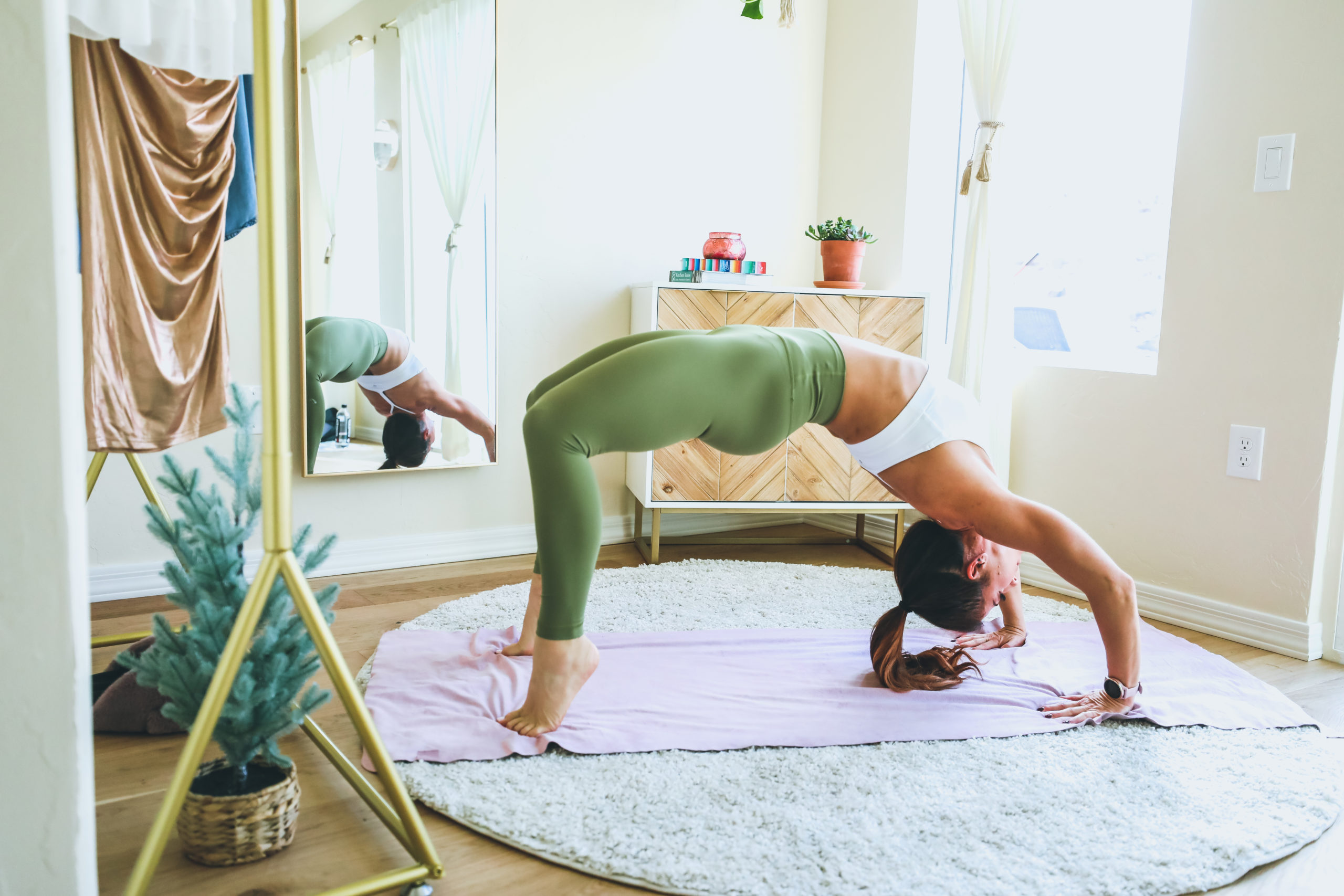
Intuitive Eating: There are three macronutrients: carbs, fats, and proteins. Don’t be afraid to ingest them. They are your energizers so that fat and protein can do their work at the cellular level.
I do too every time.
Why are we like this?
That’s the image in my head.
I’ve seen women, my friends, do keto and lose a shit ton of weight. Is it sustainable for life?
It could be. To answer your question, potentially, keto could be sustainable. I do think it leads to insulin sensitivity and some other things. Let’s be honest. We’re not living like cavemen. We live in a modern world where there’s pizza on every corner and sugary drinks. The fact that you’re going to tell me you’re going to be strict keto for the rest of your life, it’s a hard way to live. Think about social life. We couldn’t go out and have sushi. We couldn’t go out and do stuff. My philosophy is let’s live the best life. I consider our bodies a vessel. Let’s treat our vessel the best way. Let’s find a balance. We don’t need to be restrictive. That’s negative.
We couldn’t even go get a smoothie if we’re on keto.
Not if you’re on true keto, which is a whole other topic. There’s too much.
People ask me, “Is keto sustainable?” I say no. You’re saying yes.
You could survive on a ketogenic diet. Ultimately, it would have to be a strict and correct keto diet. I would say no due to modern life.
Scientifically, if you can survive, would you be happy?
No. If you slipped up, you screw yourself. I have a lot of ex-keto clients that are now insulin sensitive, meaning we can’t throw carbs back into their diet.
It’s because they’ve restricted it in the past. That makes sense. This fascinates me. I was a binge eater. I haven’t in a long time since you and I worked together, thankfully. I was a binge eater in the middle of the night. Past 12:00, I was still up. I had all these ideas running through my head. I would pick through my whole pantry, pick through my whole fridge and then I would have three meals. I was like, “What happened?” I won’t talk from personal experience. I want you to explain it. How do you direct your clients that do that away from habits like that?
First and foremost, they’re under the care of a psychologist or psychiatrist. They’re working on their issues emotionally with that. You might relate to this. I did. The food component of it is when we have an eating disorder. We tend to not eat in the mornings and save all our calories because we know we’re going to then binge at night. It’s this tug of war that we have all day, week and years-long. What I generally do is position a nutrient-dense, strategic breakfast that they have to eat that keeps them well satiated.
I never agreed with breakfast is the most important meal of the day. I truly have changed my mind on that. It truly is. I don’t like the way America thinks it should be. I do think it’s important because if we satiate and we start off great, we’re going to make better choices. For example, if I start with a bowl of cereal, which is all refined carbohydrates, I spike my blood sugar, I’m hangry and I eat again. I’m then gravitating towards a sugary thing because my body wants sugar to raise my blood sugar. We have this cascade effect happen throughout the day. If I would have had that nutrient-dense smoothie, breakfast or whatever it might be, I’m less likely to do that and very much less likely to have a binge. I usually start there.
Your body is a vessel; treat it the best way possible Click To TweetI do dabble a little bit into lifestyle, breathwork and those types of things. Bingeing and eating disorders is sympathetic. We’re going to fight or flight. Realistically, that’s irrational and not logical. I need to bring them down to a parasympathetic state that brings them to a conscious logical state. Generally, they then can snap out of it. They might start a binge and then they have to go do an exercise of breathwork and then they’re allowed as much as they want in that food that they’re bingeing on. They’re less likely to eat as much.
What about the opposite end of the spectrum like anorexia?
I don’t deal with a ton of anorexic clients. I deal with people that generally want to gain weight. Anorexia is hard because it’s a food fear almost.
That’s a lot of mental stuff.
The only thing nutritionally because it would be a tad bit out of my scope of practice would be to try to have healthy relationships with food. Working with them on understanding that a cookie isn’t going to make us gain a pound and that kind of stuff. That’s a hard one. That would probably be better for psychologists or psychiatrists to work one on one with.
It makes sense. For me, bingeing has some psychological in it. For me, it’s almost like a knee jerk, a reflex.
It’s an emotional reaction. It’s something you’re missing in life. For me, I realized my fear of abandonment was why I binge. I was loved as a kid but I wasn’t emotionally given that touch, feel love often enough as a kid that I used food as my emotional comfort. We have to pinpoint what that emotion is that makes them want to binge. From there, we work backward. It’s like, “Why did you feel that way?”
For me, I realized anytime somebody made me feel abandoned, I would eat. I had to think, “Why am I worried about being abandoned?” It went back and back into my childhood and then I determined I wasn’t emotionally given the things I needed to be able to feel safe. This then resulted in this unhealthy habit with food.
Are you hyper-aware with Willow about these things? I figured you would be.
It’s such a fine line with kids and this is what I see so much. Parents want their kids to eat the right foods and things like that. Don’t get me wrong. Willow eats donuts and processed foods. I do not restrict. I’m like, “You can have as much as you want,” type of parent. I want her to make her own choices. It’s not my mom’s fault or even her mom’s fault. I gained weight. I look fatter. “If you eat too much pasta, you’re going to gain weight.” I don’t want that for her. I tried never to talk about my weight too much. It sucks because I do a lot of anecdotal data. I’ll be weighing myself quite frequently and I’ll change my calorie intake for data for me to know how to better treat clients. I try my best not to say too much of that stuff up in front of her.
I know you let her eat what she wants to eat. I remember when you had your yes-day and the first thing she wanted was a sucker. I’m like, “Do you know who your mother is? I’m wondering.” I love her. She’s amazing. Do you ever try to educate her at all yet?
It’s important for kids to know why. If you think about a kid, as they grow, they need safety and they need to understand the plan. The first thing a kid will ask you is, “What are we doing today?” It’s not because they’re excited. They need to understand what is going to happen in their world so that they can take that in and then they get excited. The same thing with food, we want to make sure that we’re explaining why certain foods are good and why certain foods are bad but not in a negative form.
I wouldn’t say, “You can’t have mac and cheese because it’s overly processed. It’s going to make you fat.” I would say, “Mac and cheese are not as nutrient-dense as broccoli or a chicken or a berry. We have it in moderation like we have berries, chicken and broccoli in moderation.” It’s a little bit more positive and a why behind it. We’ll then talk about the minerals or micronutrients within foods or what protein does. I try to get a little bit sciency without being too crazy.
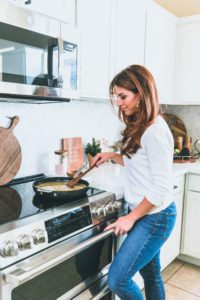
Intuitive Eating: When you have an eating disorder, you tend to not eat in the morning. This saves all your calories so that you binge eat at night. It’s a constant tug of war that you have to deal with.
Let’s say when you add the egg into her mac and cheese to add the protein, do you tell her about that?
Yes. She doesn’t know about it. There are things that I add. In her smoothie, I don’t tell her that there are super greens in there. She doesn’t care to know. I have her taste a lot of the recipes I create because I want to know. If she doesn’t like it then most people won’t like it. She’s open to trying new things but she also is a kid and wants Cheerios and doughnuts.
Do you explain to her why you put the egg in the pasta? Does she understand that?
Yes. It’s always important to teach kids everything and anything. If you’re walking down the street and they point out a homeless person, that’s a teachable moment in my opinion. We were in Boston and it was raining and there was a homeless man there and she goes, “What’s going on with him?” I was like, “He’s homeless.” She goes, “What does that mean?” I explained it to her and she goes, “Wow.” I go, “How does that make you feel?” She goes, “I feel sad for him. He’s wet.” I go, “Should we ask him if he would like our umbrella?” She says, “That’s a good idea.” I asked him and he said no. He didn’t want it. He was fine. He had a little poncho. He was good. She got to see that and that was such a teachable moment. Whereas the choice I could have made was, “It’s a homeless person.”
“Don’t look at him. Don’t worry about it.”
The best way to do it with kids is to make it teachable. Don’t make it about restricting or negative. It’s a moment of teaching. If they’re like, “I don’t want the broccoli,” then we talk about it. Sometimes what I’ll do is if she doesn’t finish her plate of food and then an hour later, she’s like, “I’m still hungry.” I always set that plate of food aside and then when she says, “I’m hungry.” I say, “Here’s your plate.” She’ll be like, “I want something else.” I’m like, “If you’re hungry, this is what we have. This is what you can eat.” That’s a better way than the way we were maybe raised, which was, “You better eat everything off your plate.” That’s forceful and negative.
You made a little empath. That’s what you did.
She’s such an empath. She can hear people crying in a store and she picks up on it. She’s uber-sensitive. She’s the kindest and sweetest soul that I want to keep in a bubble.
She’s smart. She’s your mini. She’s exactly like you. That’s wild. I want to talk about Your Happy Healthy Journey. First of all, I am proud of you. Your content is clean. It’s beautiful. It’s well presented. It’s basic enough where people can understand but also educational. Tell me what the inspiration was. You already have this job that takes a lot of your time. What inspired you to create Your Happy Healthy Journey and your brand?
Years ago, I had almost like an awakening, a come to Jesus, like, “You’re not happy with your life and you’re in a place that is going to hurt you. You’re going to get sick.” Through that process, I rediscovered myself. I don’t know if you feel this way but I didn’t know who I was as a woman or as a person until 34, 35. Maybe I’m a late boomer. I don’t know.
I started realizing I was all these things that weren’t me. I started peeling back the layers of that and came to realize I’m super unhappy. I’m not in a place where I want to be. I have all this success and I had the perfect marriage and all these things but I still wasn’t feeling fulfilled. In finding that, I also realized how much nutrition was my calling and my purpose. I truly feel that is why I’m here on this earth. It’s to educate and impact a large number of people through my words. I started looking into that.
I went back to school, got my certification as a nutritional therapy practitioner and then started Your Healthy Happy Journey. I was like, “I want to inspire other women not just through food because food is important but mental health is important.” It’s much like what you’re doing on your platform, which is freaking amazing. It’s that same thing.
We have to realize as women that we have much more to give than that submissive role. We can be that. We can be feminine but we also have this amazing voice and this amazing potential. I wanted to advocate for that for women. I said, “I might as well try to do this Instagram.” I know I’ve asked you a bazillion questions and you have been so sweet and generous to help me understand it. Watching you has helped me so much. I did it and I love every second of it. I want to cook more and more and do more things.
You’re helping so many people and you’ve helped me incredibly. My relationship with food has completely changed. I was able to help my sister, who was diagnosed with gestational diabetes. I know we spoke about it. My sister’s a healthy person. She’s not a sugar monster or anything. I know it sometimes happens with pregnancy. I was able to help guide her. At first, she was like, “The doctor said, ‘Don’t eat carbs.’” I’m like, “That doctor is an idiot.”
It happened to her where she had a plate of pasta for dinner and she crashed. She felt terrible. I was like, “It’s because your blood sugar went like this and you had nothing to balance it out.” She then listened to me and she went to a different doctor and they told her what you and I always discuss about the macronutrients. She’s like, “You’re right.” I’m like, “Who is this? Can I talk to my sister, please? I don’t know who you are.” It helped me help her.
If you start your day great, you're going to make better choices. Click To TweetYour message is spreading. Maybe she will have a friend with gestational diabetes and she’ll impart that knowledge. Your message is reaching women upon women. It’s cool to see your message spread like that. I have friends that talk to me all the time that are like, “Your friend, I follow her. It’s helped me so much. I love her recipes.” Your pickle chip recipe is so good. I loved it. I made my dip with low-fat sour cream and I put some ranch packet in it. It was very good.
They were all delicious. I was like, “Yes.”
The barbecue pork rinds worked out. It was fine. That’s all they had.
I was like, “That would work even better.”
It was fine. It’s important when you’re like, “Stop what you’re doing. You have to listen to this.” It’s quick. It’s not like you sit there for a minute and babble. You’re not like, “This will do this for you.” You get to the point. You’re like, “This is the recipe and it’s protein-packed.” You say all the things quickly in succession and I love that.
That means so much. Thank you.
I love it. You are also a chef. Speaking of all these recipes that you’re posting, how do you come up with these ideas? That’s what I’m curious about.
It’s crazy. I get asked this all the time. I don’t know if other chefs would say this too but it makes sense in our head. Everybody’s like, “How do you know that flavor will go with it?” I’m like, “I don’t know. It sounds like it would.” I don’t know how to explain it. I’ll dream. I dreamt about those fried pickles. I woke up and was like, “I have to make these.” I’ll get inspiration from eating out or something like that. If somebody’s like, “I want Thai.” I’m like, “My wheels are turning. Could I make Thai food?”
I wasn’t ever planning on putting out this much recipe content but I started realizing that most of the blog posts are great and healthy alternatives. They have good ingredients. Macronutriently, they’re not balanced. They would be pushing out these muffins that were extremely high carbohydrate and you see it. It’s like, “Look at this vegan peanut butter banana toast.” I’m like, “That’s going to spike somebody’s glucose so much.”
It is healthy ingredients. It’s still healthy but not the healthiest. It’s not productive to what our system needs to do well. I try to be thoughtful first on how does it affect the body cellularly and then the second is flavor. I was like, “I got to put this out there.” This is as important as what I have to say, it’s how we eat. I wanted as many recipes out to the public as possible so that there’s a balance at least. A lot of my stuff does have a lot of protein in it.
I would love to see you do a full-on cookbook. I feel like you already have the cover for it. You were craving pasta with garlic, butter and stuff. You made it with kelp noodles. I’ve never had them. Can you tell me about that alternative and why you chose kelp noodles? I know but the other people don’t know.
There are so many good alternatives to pasta. Kelp noodles have zero carbs. There are no carbs but they’re micronutrient-dense, meaning there’s a lot of minerals in it because it’s seaweed. I’m Italian so I am particular about my pasta. It gives me the closest thing to pasta. I grew up in Hawaii and I ate a lot of Asian noodles. It reminds me of Asian noodles and pasta at the same time. Maybe that’s where it happens.
It gets soft like a noodle and the creaminess can be created because it absorbs some of that too, whereas a Palmini noodle or pasta won’t and this kelp noodle would. All I did was some ghee because I don’t do butter. I do clarified butter and some garlic. Hemp seeds trick my mind at least. It makes it feel like cheese. I put a little bit of hemp seed, which is protein and fat-rich and some fat with the butter, garlic and the noodles. It was delicious that I ate the whole freaking bag in one sitting.
I always heard nutritional yeast was good for a cheese substitute.
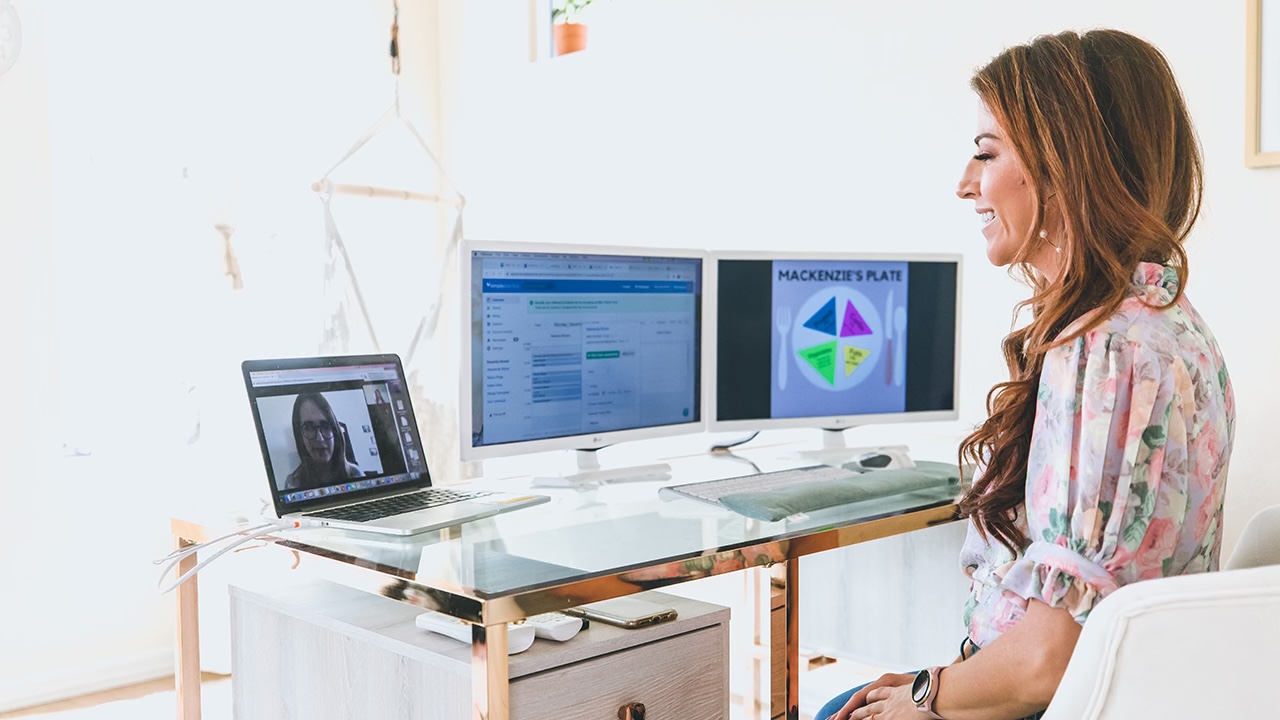
Intuitive Eating: In order to live the best life, you have to have these priorities in this numerical order. Stress, sleep, and nutrition. Without one of them, nutrition doesn’t matter anymore.
My problem with this is 90% of the women I treat have dysbiosis, which you are familiar with. Dysbiosis is an overgrowth of bad bacteria to good bacteria. The problem is most women have dysbiosis with yeast bacteria. When we do something like that especially any of my clients that have BB and struggle with that stuff, they get more stuff down there. Personally, for someone who used to suffer from UTIs and yeast infections all the time, I avoid it. If you don’t have that then that’s a super good alternative.
Ghee is confusing to me because it is from butter but it’s not dairy.
They stole all the proteins. What’s cool about food and why I love food and nutrition so much. It’s just molecules. All those molecules interact with each other. It’s science. That’s my wheelhouse. All we’re doing is pulling out those proteins and then it becomes dairy-free.
You were talking about your stomach issues before and you did have allergies. Let’s talk about stress because that plays a huge role. As you know, for a whole month, I thought I had some sort of virus, infections and maybe even some parasites. Ultimately, I don’t have those anymore. It ended up being pure stress. It affected my gut health. What about you? Do you find that when you are going through a stressful period that you sometimes get those same symptoms even when you’re eating like you are? Is it resolved because you’re eating the way you’re eating?
That’s important to bring up. I always tell people that you can eat as clean as I eat. If your stress is not handled, you will be sick. I can’t fix that. There’s a big reason. Our digestive tract lives in parasympathetic, which is our relaxed state. Sympathetic, fight or flight, is where our oxidative stress lives.
If we live in a long period of stress because our body can’t come and talk to you, our only way to show there’s an issue is through putting symptoms in you, diarrhea, constipation, bloating, indigestion and all these things. What happens is, we see this then those systems, those organs maybe start to lose their function and then we see some disease occur.
When I talk to people, nutrition is what I do. To live the best life, you have to have these priorities in this numerical order, stress, sleep and then nutrition. Without the two, the nutrition doesn’t matter, in my opinion. I will probably piss off a lot of nutritionists. Don’t get me wrong. If you ate as clean as me, you would be doing yourself help. You’re not adding stress to the body. I could see their argument there. Truly, without stress being alleviated and without sleep being there, your sleep hygiene, there’s no way that you’re going to optimize your health. You will probably end up leading to disease, unfortunately, due to the way we eat nowadays.
Sometimes we can’t control our stress. Some of us have an anxiety disorder. We have depression. We have things in our lives that we can’t control. We have breakups, deaths in the family, our dog passes away or is in sick health. You and I both have been going through it with regard to our relationships. With your marriage, there’s been a little bit of rockiness. My relationship ended as you know. We’re happy about that.
To be real with our audience, you’ve had some days where you and I’ve been texting and you’re like, “Steph, I am not put together. I feel horrible.” Even the way that you live, even the fact that you work out almost every day, you are active, you have a beautiful daughter that you interact with and you have this wonderful career, all of those things and you still have those days.
It does affect your body. I separated from my husband, which was a hard decision to come to. I had to come to the realization that I failed. You could look at it that way. That’s the way in which we look at it. I don’t think of it that way. It was a hard pill to swallow. When I got married, I was like, “This is forever.” What I realized is that for the stress to not occur and to feel my best, I had to be unapologetically me. I had to put myself first and step into my power and say, “This is no longer serving me.” As soon as I did, everything changed. I was already feeling good but I felt lighter.
People used to be like, “You would walk in a room and I didn’t know if a shitstorm was coming through or what was happening. You’re fast-paced, all over the place and a mess.” I held it together well. On camera or behind the scenes, you wouldn’t have known what was going on but there’s some stuff going on. Now, I wake up and I’m at peace. It’s a different feeling.
It’s important for people to realize the first person that matters is you. I say this before Willow. My happiness matters before Willow. Now her health and safety matter first. If I’m not happy, I’m not a good mom. I was a good mom but I wasn’t as good of a mom as I am now. Before I would get frustrated and yell or get irritated easily and it was because I lived in this sympathetic state. I was unhappy in a situation and I didn’t know how to communicate that.
You were reacting.
I was living very reactive and it led me to a dark place. I’m thankful that I was mentally strong enough to not have those negative thoughts turn into actions. Now I see the other side of it and I’m like, “This is truly what feeling good feels like.” Now, people are like, “You’re different. You’re calm. You don’t react. I could call you a bitch right now and you’d probably be like, ‘That’s okay. I could understand why you feel that way.’”
You can eat as healthy as you can but if your stress is not handled, you'll still be sick. Click To Tweet“Thank you for sharing your feelings with me.”
I take them seriously but I’m parasympathetic now that it’s hard to get me up here anymore. I don’t feel it anymore and that comes with being at a place of peace.
When you’re co-parenting and when you’re with your husband now, are there times where you feel triggered?
Any person that has gone through a divorce knows that process especially with kids. In the beginning, when we were doing this transition, we always said that Willow comes first. In the beginning, there were a lot of triggers. I triggered him and he triggered me. We couldn’t figure out the balance. We have come to a good place where we come from a place of kindness and love. He is not a bad person. He is an amazing dad. I still love him. We’re not right for each other. Maybe down the road, I don’t know. That story is not told yet. It’s now coming from a place of calm and ease. With co-parenting, my strategy at first was, “We’re going to be the best friends.” That doesn’t work. There are people that do it and I applaud them.
For us, what works best is we have a structure, a schedule and we’re kind to each other. When Willow is here, I talk wonderful things about her dad. I’m sure he does the same when she’s with him. That’s where we draw the line. There’s not this engagement of trying to be besties or anything like that. It helps both of our healing processes. It wasn’t anything bad in the marriage. We both had issues within ourselves that we had to deal with.
For me, a big part of it was I’ve never been able to walk by myself and truly be unapologetically me. I’m living that right now. I’m discovering things about myself that I love, that I don’t like, that I want to change, that I want to work on. I lived in fear for so long. I played soccer. I was scared to go because, believe it or not, I’m quite shy when I don’t know people.
I meet a group of people that I had no idea about. I didn’t know where I was going. I’m a little bit type-A personality so I like to know everything. I had the best time of my life. I felt freaking alive and joyful. I’m getting to discover and determine who I want to be and if I want people in my life and what that looks like and setting boundaries. It’s similar to what you’re going through, too.
The biggest thing I want women and men to know is it’s okay to set boundaries and it’s okay to “have these failures.” I don’t think they’re failures. They’re learning experiences. That’s a part of life. Don’t live in misery because it’s consistent and it’s easy. Either way, stay or go or do whatever it is in your life but challenge yourself because the piece on the other side is quite fantastic.
This is a theme that has come up many times with some of my lady friends that I’ve been speaking with especially on the show. When you’re comfortable, you’re not growing. Now that you and I have put ourselves in the most uncomfortable positions of all time, we’re doing the most growth, which is interesting to me. When I’m uncomfortable, I’m like, “This is fine. On the other side, it’s going to be better.”
There’s one on TikTok that’s like, “Once you realize people are as fucked up as you are, you start looking at people differently.” It’s true. Once I took away the facade or fakeness of what I wanted people to think of me, I was like, “Here I am. I’m not for everybody. If you like me, let’s go. If you don’t, that’s cool, too,” everything changed and everything happened faster. I’ve gotten more clients. I’m building my business. I’m doing more content. I’m doing all these things because I’m in such a positive, high vibrational state.
Besides your clean eating and the way that you take care of yourself internally, how important has it been since your separation to continue with your routine with regards to fitness, wellness, mental health, your sauna time and things like that?
It was pivotable. It’s life or death for me. I was suicidal when we separated. The week I moved into my new place, my dad died. My ex and I were at our worst. It was dark. I’ve never felt that way. I truly understand why people take their lives now. If I didn’t have good eating and I didn’t have the outlet of going to the gym, lifting, sauna and meditating, I truly don’t know if I would be here. I was in a dark place.
You’re going to make me cry.
I’m good now.
I know you’re good. I don’t know what I would do without you. You’re important to me. This was good. This is some good stuff. This is probably the easiest show I’ve done, by the way. I have one more question for you but before I ask you, it’s the easiest and most flowy I’ve ever done. All of my other ones are good, too but they were all over the place with the questions. I interviewed this amazing travel couple. They’re beautiful. I wanted to ask them, “What are your travel tips for saving money?” I didn’t get to the travel part. We talked about them. We talked about relationships.
I don’t know if you saw on The Dodo, they have a viral video. It’s this puppy they rescued in Turkey that was covered in blue. It was antiseptic that a shepherd had sprayed on the dog but they saved this dog. Now it’s in the States being taken care of with a forever home with his family. They stayed in Turkey a month longer than they were supposed to, to take care of this dog and get the documents and get it back to the States.
The dog’s name is Blue. If you google The Dodo and dog blue or something, it’ll come up. One more question for you. I ask this of all of my guests. If you were to see twenty-year-old Nicola walking down Maryland Parkway, walking down the street, on-campus or whatever, you went up to her and you gave her a big hug. As you left her embrace, what is the one thing that you would say to twenty-year-old Nicola?
Don’t forget who you are. Don’t lose yourself.
I don’t even think I had me at twenty. I don’t even think I knew who I was.
We were in a position to be something we weren’t. Everybody in college, you would maybe agree with this, was scared of me. They were like, “Nicola speaks her mind.” As a person, I’m probably the biggest pushover, kindest, sweetest person. I hid that from the world because I was scared that I would get hurt that way. I built this big bad armor that was a lot tougher than I was. Now I’m living a life of my true self. I’m fine. I’m strong. You can’t hurt me. I am going to be kind. That would be that. Don’t lose yourself.
A lot of the AGDs were like that. They were strong women. Especially in our age group, they were strong-minded people. Jolie, for example. Everyone’s strong-minded like Iya. I love all of those girls. You and I have been talking for a while. Now I’m getting a lot of those college girls that we rushed with and stuff. They’re coming back and they’re talking to me and they’re giving me their accolades and their feedback on my material. I’m like, “Something’s working because these girls haven’t talked to me in a long time.”
You’re freaking killing it. Your content is needed for women. I’m your biggest fan, for sure.
I’m your biggest fan too. Nicola, thank you for taking the time to be here on The Luxury Dropout. We love having you. We’re going to have to do an update and see where your journey has taken you.
I love that. I love you.
I love you. Thank you. We will see you at the next one.
Important Links:
- Nicola Burbank
- TriMotus
- video – The Dodo viral video
About Nicole Burbank
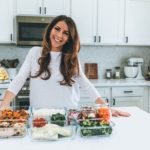 Nicola Burbank is a Nutritional Therapy Practitioner, she created Your Healthy Happy Journey as an outlet to spread positivity, motivation and educate people on all thing’s health and wellness. She is also a curator and chef creating well balanced macro nutrient dense recipes. She believes Your healthy happy journey starts with you but sometimes after you decide to make the change you don’t know what to do and she wants to help guide you in all aspects of your life from Health and wellness to better organization & time efficiency to creating positive habits in your daily life.
Nicola Burbank is a Nutritional Therapy Practitioner, she created Your Healthy Happy Journey as an outlet to spread positivity, motivation and educate people on all thing’s health and wellness. She is also a curator and chef creating well balanced macro nutrient dense recipes. She believes Your healthy happy journey starts with you but sometimes after you decide to make the change you don’t know what to do and she wants to help guide you in all aspects of your life from Health and wellness to better organization & time efficiency to creating positive habits in your daily life.

